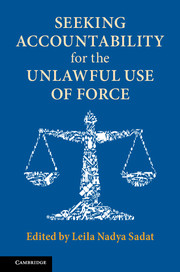Book contents
- Frontmatter
- Dedication
- Contents
- Notes on Contributors
- Foreword
- Preface
- Table of Cases
- Introduction
- PART I HISTORIC AND CONTEMPORARY PERSPECTIVES ON THE UNLAWFUL USE OF FORCE
- PART II MECHANISMS FOR RESTRAINING THE UNLAWFUL USE OF FORCE AND ENHANCING ACCOUNTABILITY
- 7 Commissions of Inquiry and the Jus ad Bellum
- 8 The International Court of Justice and the Use of Force
- 9 The Other Enemy: Transnational Terrorists, Armed Attacks, and Armed Conflicts
- 10 Toward the Substantive Convergence of International Human Rights Law and the Laws of Armed Conflict: The Case of Hassan v. the United Kingdom
- 11 International Law on the Use of Force: Current Challenges
- PART III THE ILLEGAL USE OF FORCE AND THE PROSECUTION OF INTERNATIONAL CRIMES
- PART IV IMAGINING A BETTER WORLD
- Epilogue
- Index
7 - Commissions of Inquiry and the Jus ad Bellum
from PART II - MECHANISMS FOR RESTRAINING THE UNLAWFUL USE OF FORCE AND ENHANCING ACCOUNTABILITY
Published online by Cambridge University Press: 21 May 2018
- Frontmatter
- Dedication
- Contents
- Notes on Contributors
- Foreword
- Preface
- Table of Cases
- Introduction
- PART I HISTORIC AND CONTEMPORARY PERSPECTIVES ON THE UNLAWFUL USE OF FORCE
- PART II MECHANISMS FOR RESTRAINING THE UNLAWFUL USE OF FORCE AND ENHANCING ACCOUNTABILITY
- 7 Commissions of Inquiry and the Jus ad Bellum
- 8 The International Court of Justice and the Use of Force
- 9 The Other Enemy: Transnational Terrorists, Armed Attacks, and Armed Conflicts
- 10 Toward the Substantive Convergence of International Human Rights Law and the Laws of Armed Conflict: The Case of Hassan v. the United Kingdom
- 11 International Law on the Use of Force: Current Challenges
- PART III THE ILLEGAL USE OF FORCE AND THE PROSECUTION OF INTERNATIONAL CRIMES
- PART IV IMAGINING A BETTER WORLD
- Epilogue
- Index
Summary
Commissions of inquiry are not among the protagonists within the jus ad bellum architecture. Nonetheless, historically, several international commissions have been established in different institutional settings specifically to inquire into situations involving the use of force. These include theDogger Bank Inquiry into Russian firing at a U.K. trawler, the Lytton Inquiry regarding Japanese military action in Manchuria in 1931, and the 1961 Red Crusader Inquiry into a naval incident involving the United Kingdom and Denmark. A few contemporary commissions have also addressed jus ad bellum questions, even if not all were explicitlymandated to do so. These contemporary inquiries include international commissions established by the U.N. Security Council, Secretary-General, and Human Rights Council (HRC); regional commissions and national commissions. The Human Rights Council in particular has been very active lately in establishing commissions of inquiry.Despite the identity of their parent body, the HRC commissions have generallymade reference to areas of law beyond human rights, particularly international humanitarian law and international criminal law.
Given their direct engagement with law, commissions of inquiry have loosely been characterized as a new form of adjudication offering some accountability prospects. As these commissions tend to operate in peace and security contexts, this Chapter assesses the current and potential role of commissions of inquiry in the overall legal framework regarding the use of force. The Chapter aims to locate commissions of inquiry within the greater jus ad bellum architecture. It portrays the diversity of the inquiry landscape and zeroes in on the Kosovo and Iraq Inquiries as concrete examples of inquiry practice operating in situations that evoked fundamental jus ad bellum questions. The Chapter also offers thoughts on the accountability potential of commissions of inquiry and on how they relate to other jus ad bellum actors.
Section II first presents the most relevant contemporary international, regional, and domestic commissions of inquiry and interrogates how they have construed a jus ad bellum dimension into their mandates. Given the Human Rights Council's activity in establishing commissions of inquiry, it is specifically examined whether, given the recent activation of the International Criminal Court's (ICC's) jurisdiction over the crime of aggression, future HRC commissions of inquiry may be expected to become more active in the jus ad bellum domain.
- Type
- Chapter
- Information
- Seeking Accountability for the Unlawful Use of Force , pp. 171 - 193Publisher: Cambridge University PressPrint publication year: 2018



